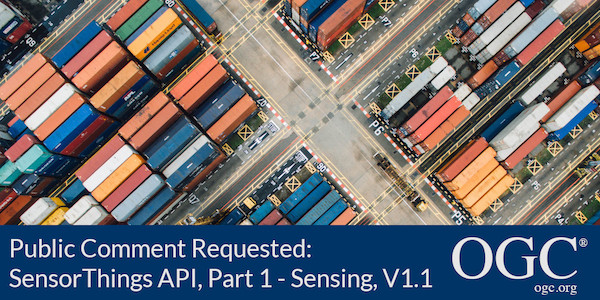Version 1.1 is a minor update to OGC's IoT standard, which is used across the globe in logistics, public safety, energy utilities, environmental monitoring, and more.

The Open Geospatial Consortium (OGC) seeks public comment on Version 1.1 of the OGC SensorThings API, Part 1 – Sensing. Comments are due by the 6th of July, 2020.
The OGC SensorThings API provides an open, geospatially enabled, unified way to interconnect Internet of Things (IoT) devices, data, and applications over the web. SensorThings is currently being used by organizations around the world in support of logistics, public safety, energy utilities, environmental monitoring, and more.
At a high level, the OGC SensorThings API provides two main functionalities, with each function handled by a specific part of the standard: Sensing and Tasking.
Under public comment is a new version (v1.1) of the Sensing part, which provides a standard way to manage and retrieve observations and metadata from heterogeneous IoT sensor systems. The separate Tasking part provides a standard way for parameterizing – also called tasking – of taskable IoT devices, such as sensors or actuators.
Version 1.1 of the OGC SensorThings API is mostly backwards compatible with v1.0. The main changes in v1.1 include:
- An additional field for storing additional metadata that is useful for filtering.
- Additions to the service root page that allow users to easily see exactly which extensions and optional features a server implements. Additionally, the MQTT extension can now list the MQTT endpoints on the root page so that a user can discover those endpoints.
- A fix for inconsistencies and incompatibilities surrounding the transmission of the specification version number in MQTT topics.
The first two changes should not impact clients implemented based on version 1.0. The third change, however, may cause some minor issues for some clients that are not using the version prefix in MQTT topics.
The candidate ‘SensorThings API Part 1 – Sensing' v1.1 standard is available for review and comment on the OGC Portal. Comments are due by the 6th of July, 2020, and should be submitted via the method outlined on the ‘SensorThings API Part 1 – Sensing' v1.1 Standard's public comment request page.
For anyone interested in learning more about the SensorThings API, the SensorThings API Domain Working Group chair, Steve Liang, recently presented an overview of SensorThings, including how it's being used during COVID-19. The recording is available on the OGC's webpage for its webinar series on OGC Working Groups.
About OGC
The Open Geospatial Consortium (OGC) is an international consortium of more than 500 businesses, government agencies, research organizations, and universities driven to make geospatial (location) information and services FAIR – Findable, Accessible, Interoperable, and Reusable.
OGC's member-driven consensus process creates royalty free, publicly available geospatial standards. Existing at the cutting edge, OGC actively analyzes and anticipates emerging tech trends, and runs an agile, collaborative Research and Development (R&D) lab that builds and tests innovative prototype solutions to members' use cases.
OGC members together form a global forum of experts and communities that use location to connect people with technology and improve decision-making at all levels. OGC is committed to creating a sustainable future for us, our children, and future generations.
Visit ogc.org for more info on our work.
“







